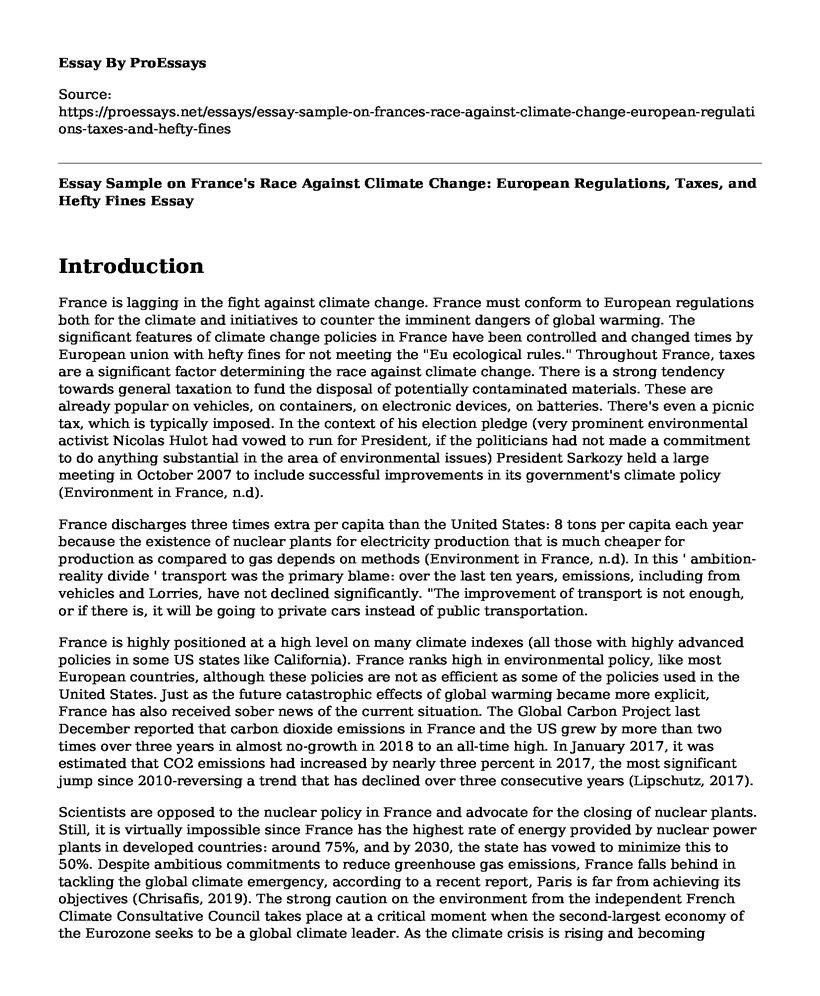Introduction
France is lagging in the fight against climate change. France must conform to European regulations both for the climate and initiatives to counter the imminent dangers of global warming. The significant features of climate change policies in France have been controlled and changed times by European union with hefty fines for not meeting the "Eu ecological rules." Throughout France, taxes are a significant factor determining the race against climate change. There is a strong tendency towards general taxation to fund the disposal of potentially contaminated materials. These are already popular on vehicles, on containers, on electronic devices, on batteries. There's even a picnic tax, which is typically imposed. In the context of his election pledge (very prominent environmental activist Nicolas Hulot had vowed to run for President, if the politicians had not made a commitment to do anything substantial in the area of environmental issues) President Sarkozy held a large meeting in October 2007 to include successful improvements in its government's climate policy (Environment in France, n.d).
France discharges three times extra per capita than the United States: 8 tons per capita each year because the existence of nuclear plants for electricity production that is much cheaper for production as compared to gas depends on methods (Environment in France, n.d). In this ' ambition-reality divide ' transport was the primary blame: over the last ten years, emissions, including from vehicles and Lorries, have not declined significantly. "The improvement of transport is not enough, or if there is, it will be going to private cars instead of public transportation.
France is highly positioned at a high level on many climate indexes (all those with highly advanced policies in some US states like California). France ranks high in environmental policy, like most European countries, although these policies are not as efficient as some of the policies used in the United States. Just as the future catastrophic effects of global warming became more explicit, France has also received sober news of the current situation. The Global Carbon Project last December reported that carbon dioxide emissions in France and the US grew by more than two times over three years in almost no-growth in 2018 to an all-time high. In January 2017, it was estimated that CO2 emissions had increased by nearly three percent in 2017, the most significant jump since 2010-reversing a trend that has declined over three consecutive years (Lipschutz, 2017).
Scientists are opposed to the nuclear policy in France and advocate for the closing of nuclear plants. Still, it is virtually impossible since France has the highest rate of energy provided by nuclear power plants in developed countries: around 75%, and by 2030, the state has vowed to minimize this to 50%. Despite ambitious commitments to reduce greenhouse gas emissions, France falls behind in tackling the global climate emergency, according to a recent report, Paris is far from achieving its objectives (Chrisafis, 2019). The strong caution on the environment from the independent French Climate Consultative Council takes place at a critical moment when the second-largest economy of the Eurozone seeks to be a global climate leader. As the climate crisis is rising and becoming increasingly apparent, Americans remain opposed to productive and meaningful climate change action.
Conclusion
Conclusively, the report found that reductions in carbon dioxide emissions in France did not occur fast enough. The first official target of France, the 2015-17 carbon budget, has not been fulfilled. Over this period, annual emissions fell by only 1.1 percent significantly lower than expected (Lipschutz, 2017). To meet the targets, the authors stated that the rate of decline must triple by 2025. On the other hand, Climate change has already affected communities across the United States. Rising sea levels, increasing droughts, heatwaves, and fires are threatening cities and towns in the USA. And they're going to get worse without climate action.
References
Chrisafis, A. (2019, June 25). France failing to tackle climate emergency, report says. Retrieved from https://www.theguardian.com/world/2019/jun/25/france-failing-on-climate-emergency-report
Environment in France. (n.d.). Environment in France; ecology; biodiversity; national parks. Retrieved from https://www.understandfrance.org/France/Environment.html
Lipschutz, R. (2017). Can Climate Change Us? Development and Change, 48(3), 623-635. doi:10.1111/dech.12302
Cite this page
Essay Sample on France's Race Against Climate Change: European Regulations, Taxes, and Hefty Fines. (2023, Mar 12). Retrieved from https://proessays.net/essays/essay-sample-on-frances-race-against-climate-change-european-regulations-taxes-and-hefty-fines
If you are the original author of this essay and no longer wish to have it published on the ProEssays website, please click below to request its removal:
- Leadership in Energy and Environmental Design Methodologies
- The Greatest Threat to the United States Essay
- Creating Native Habitats in Miami Essay Example
- Essay Sample on LA's Population and Natural Disasters
- Ocean Pollution: A Growing Global Challenge - Essay Sample
- Essay Example on 2 Extinct Organisms: Why They Vanished From Earth
- Biodiversity: Exploring the Variability of Living Organisms - Free Report Example







